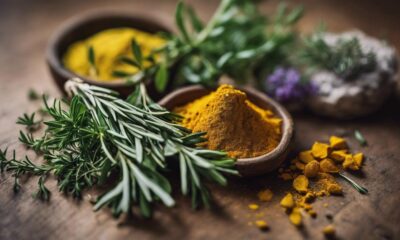Herbalism
How Long Does It Take to Get a Herbalism Degree?
Gaining a herbalism degree can take anywhere from one to four years, depending on the program and certification requirements.

We typically spend between one to four years completing a herbalism degree program, with some programs requiring up to 1600 hours of study for certification. Bachelor's degrees usually take four years, while certificate programs can be completed in one year. Flexible learning options, including distance learning, are available, and prices range from $400 to $2,500. Naturopathic physician paths require a Bachelor's degree plus a four-year Doctor of Naturopathic Medicine program. As we explore the various paths to becoming a herbalist, we'll discover more about the differences in program lengths and requirements.
Key Takeaways
• Certificate programs in herbalism typically take 1 year to complete, while bachelor's degrees take 4 years.
• Some programs require up to 1600 hours of study for certification, which can take 2-4 years to complete.
• Full-time herbalism programs can take 1-4 years, while part-time study can take 1-3 years.
• Master's degree programs in herbalism usually take 2-3 years to complete.
• Naturopathic physician path requires a bachelor's degree and 4-year Doctor of Naturopathic Medicine program, taking a total of 8 years.
Types of Herbalism Degree Programs
We can pursue a range of herbalism degree programs, from certificate programs that can be completed in as little as a year to bachelor's degrees that take four years to finish. These programs vary in duration and intensity, with some requiring as many as 1600 hours of study for certification.
For those interested in becoming naturopathic physicians, a bachelor's degree is typically required, followed by a 4-year Doctor of Naturopathic Medicine program. Fortunately, many herbalism degree programs offer flexible learning options, including distance learning, which can be a cost-effective choice, with prices ranging from $400 to $2,500.
In contrast, full-time herbal medicine school tuition can range from $5,000 to $15,000 per year. By understanding the different types of herbalism degree programs available, we can make informed decisions about our education and career paths. Whether we're interested in certification, a bachelor's degree, or a career as a naturopathic physician, there's a program out there to suit our needs and goals.
Duration of Herbalism Studies

As we explore the duration of herbalism studies, we'll examine the different paths we can take to achieve our goals.
We'll look at full-time study paths, which allow us to focus intensively on our herbalism education, and part-time study options, which offer more flexibility.
Full-Time Study Paths
Typically, full-time herbalism programs can be completed in anywhere from 1 to 4 years, depending on the level of education pursued. We're interested in becoming herbalists, and we want to know how long it takes to get a degree in herbal medicine.
As we explore the world of herbal education, we discover that the duration of our studies will depend on the level of education we're after.
For instance, if we're aiming for a Bachelor's degree in herbalism, we're looking at around 4 years of full-time study. This extensive program will equip us with a solid foundation in herbal medicine, preparing us for a career as a qualified herbalist.
On the other hand, if we're interested in pursuing a Master's degree in herbal medicine, we can expect to spend around 2 to 3 years studying full-time.
Certificate programs in herbal studies vary in duration, but we can expect to spend anywhere from 6 months to 2 years studying herbalism.
Whatever path we choose, we're excited to commence on this journey, exploring the world of herbalism and becoming qualified herbalists.
Part-Time Study Options
Part-time herbalism students can expect to spend anywhere from 1 to 3 years completing their degree, depending on the program's requirements and their individual pace. This flexible approach allows us to balance our education with work, family, or other commitments.
| Study Style | Duration | Description |
|---|---|---|
| Full-time | 1-2 years | Intensive study schedule |
| Part-time | 1-3 years | Flexible scheduling, fewer courses per semester |
| Online | 1-3 years | Accommodates work or other commitments |
| Self-paced | 1-5 years | Learn at your own speed |
Herbalism Certification Requirements

To become a certified herbalist, we need to fulfill specific requirements, including completing a significant amount of educational hours and gaining practical experience. The American Herbalists Guild sets the standard for herbalist certification, which involves passing a written exam and submitting case studies to become a Registered Herbalist.
To meet these requirements, we need to complete at least 800 hours of herbal education and 400 hours of clinical experience. This hands-on experience is vital in developing our skills as herbalists, allowing us to apply theoretical knowledge in real-world scenarios.
Choosing an Herbalism School

When choosing an herbalism school, we must carefully assess several key factors to make sure we receive a thorough education that equips us for a successful career in the field.
- We should consider the curriculum coverage in herbalism schools, including botany, pharmacology, nutrition, and professional practice.
- We need to look into the average length of study, with herbalist certification typically requiring around 1600 hours of education.
- We should evaluate the average tuition costs, with distance learning programs ranging from $400 to $2,500 and full-time herbal medicine school costing $5,000 to $15,000 per year.
- We must review licensing requirements, noting that there's no federal or state-level regulation for herbalism school graduates, but naturopathic doctors may require licensing in certain regions.
Herbalism Program Curriculum

We'll now explore the herbalism program curriculum, which is where the rubber meets the road in our educational journey, as it sets the foundation for a successful career in herbalism.
This all-encompassing curriculum covers essential topics like botany, pharmacology, physiology, nutrition, and professional practice. We'll dive into the study of plants, their properties, and how they interact with the human body.
We'll also investigate pharmacology, which focuses on the effects of herbal remedies on the body. In addition to theoretical knowledge, we'll gain practical skills through hours of clinical experience, where we'll learn assessment, recordkeeping, and herbal remedy preparation.
Our professional practice coursework will prepare us for real-world scenarios, ensuring we're well-equipped to start our careers in herbalism. With a recommended 1600 hours of study, we'll be well-versed in the art and science of herbalism.
Online Herbalism Education Options

Our pursuit of a herbalism degree just got more flexible with online education options, offering a range of programs that cater to different learning styles and goals. We can now choose from various online herbalism programs that fit our schedule and learning pace.
- Online herbalism education offers flexibility in program duration, allowing us to study at our own pace.
- Some online herbalism programs can be completed in as little as 12 weeks, providing quick access to herbal knowledge.
- Longer online herbalism courses may span up to 2 years, offering more in-depth education and clinical experience.
- Tuition for online herbalism programs varies, ranging from $400 to $2,500 for distance learning options.
With online herbalism education, we can pursue a degree from an accredited university from the comfort of our own homes. This convenient and cost-effective way to gain herbal knowledge allows us to develop our level of expertise and practice ethical herbalism.
Online herbalism programs provide a great opportunity to gain the knowledge and skills needed to succeed in this field. By choosing the right online program, we can take the first step towards a fulfilling career in herbalism.
Career Paths for Herbalists

As we explore the world of herbalism, we're excited to discover the various career paths available to us.
We can create herbal remedies, work in the herbal products industry, or even offer natural health consulting services to clients.
These career paths not only allow us to make a positive impact on people's lives but also provide us with a sense of fulfillment and purpose.
Herbal Remedies Development
Developing herbal remedies is a multifaceted career path that allows herbalists to work in small manufacturing companies, cultivate medicinal herbs, offer consultation services, or explore various roles in herbalism.
As herbalists, we can create herbal products that promote health and wellness, using medicinal plants to develop effective herbal therapy.
To become an herbalist, we can pursue education and training in herbalism, which can lead to various career opportunities.
Here are some potential paths in herbal remedies development:
- Working in small manufacturing companies to create herbal products for consumers
- Growing and cultivating medicinal herbs for use in herbal remedies
- Offering consultation services to clients seeking herbal therapy and health advice
- Exploring various roles in herbalism, such as education, research, or advocacy
Herbal Products Industry
We enter the herbal products industry, where opportunities abound for herbalists to create and market their own products, consult with clients, or work with established companies. In the United States, the herbal products industry is growing rapidly, providing a wide range of career paths for herbalists.
Many herbalists choose to start their own businesses, creating and selling herbal remedies, teas, and supplements. Others work with manufacturing companies, helping to develop and produce herbal products. As business owners, herbalists can work independently, creating their own products and marketing strategies.
While certification isn't required to start a herbal business in the United States, having a strong educational background in herbalism can be beneficial. Accredited universities offer paths in herbal education, which can be beneficial for herb product makers and enthusiasts.
With the lack of federal recognition or licensed path for becoming a certified herbalist, many herbal business owners have learned through online courses and experience, making it accessible to enthusiasts.
Natural Health Consulting
In the field of natural health consulting, we step into a dynamic career path where herbalists guide clients in adopting healthy lifestyles and informed self-care practices. As natural health consultants, we educate clients on the benefits of herbal medicines and provide personalized advice on nutrition, wellness, and stress management. We work closely with clients to identify health goals and develop tailored plans to achieve them.
Some key aspects of natural health consulting include:
- Collaborating with naturopathic medicine practitioners to offer thorough care
- Developing personalized wellness plans incorporating herbal remedies and nutrition
- Providing education on healthy lifestyle choices and self-care practices
- Working with clients to set and achieve health goals, such as stress reduction and improved nutrition
As natural health consultants, we may work in private practice, hospitals, or integrative health centers like the University of Integrative Health. We may also choose to join professional organizations like the American Herbalists Guild to stay updated on the latest research and best practices in herbalism.
Advancing Your Herbalism Career

As we build our skills and knowledge in herbalism, opportunities in private practice, wellness centers, and herbal product research roles become increasingly accessible. We can choose to become a registered practicing herbalist, which typically takes around 2 years to complete an associate degree or diploma.
However, it's essential to note that some programs, like the Master of Science in Clinical Herbal Medicine, may have specific start dates, usually in the fall or spring trimesters. The good news is that many of us will find employment within a year of graduating, with 75% of recent graduates securing jobs in the field.
We can explore a wide variety of roles, from working in wellness centers to researching herbal products. To become a registered herbalist, we need to meet the educational requirements, which some programs, like MUIH's, already fulfill 100% of. By advancing our herbalism career, we can take our skills to the next level and make a meaningful impact in the natural health industry.
Frequently Asked Questions
How Long Does It Take to Become a Herbalist?
We're curious about becoming a herbalist, and rightfully so! The journey to get there varies, but we've got the scoop.
Generally, it takes around 12 months to complete a certificate program, while an associate degree or diploma can take up to 2 years. For certification, we need to log 800 hours of herbal education, including clinical experience.
The time commitment depends on the program and our educational background.
Do Herbalists Make Money?
We're curious about the financial prospects of a career in herbalism. So, do herbalists make money? The answer is yes!
We can earn a living through various career paths, such as sales, consultation services, and even owning apothecary shops.
With a herbalism degree, we can find employment in small manufacturing companies, herbal product research, and wellness centers, which can provide a stable income.
What Is the Best Degree for a Herbalist?
We're often asked what's the best degree for a herbalist. Surprisingly, did you know that 80% of herbalists are self-taught, yet formal education can greatly enhance their skills?
When it comes to herbalism degrees, a Master of Science in Clinical Herbal Medicine is a top choice. This all-encompassing program provides hands-on learning, mastering foundational herbal knowledge and clinical skills. It's ideal for those seeking a career in herbal industry leadership, private practice, or herbal product research.
Is There a Demand for Herbalists?
We're excited to explore the demand for herbalists!
The good news is that the demand is increasing, with the herbal medicine industry generating billions of dollars in revenue annually.
As a result, herbalists have various career opportunities, from working in small manufacturing companies to cultivating herbs, offering consultation services, and even entrepreneurship.
With the growing interest in alternative medicine, we're confident that the demand for skilled herbalists will continue to rise.
Conclusion
As we conclude our journey into the world of herbalism, we're left with a sense of excitement and anticipation. The path to becoming a certified herbalist is long, but the rewards are well worth the effort.
With a solid education and certification, the doors to a fulfilling career open up for us. But we're not done yet – the real adventure begins as we explore further into the world of herbalism, discovering its secrets and pushing the boundaries of what's possible.
The future of herbalism is bright, and we're just getting started.
Herbalism
Where to Learn Herbalism: Top 7 Starting Points
Pursue the path to herbalism mastery by uncovering the top 7 starting points that will propel your journey to new heights.

We're excited to start our herbalism journey! To get started, we'll need to find trusted trainers in major cities who can guide us in honing our skills. We'll also need essential tools like the Herbalist's Spade and useful addons like Gathermate2 to track herb node locations. Exploring starting zones like Durotar and Elwynn Forest helps us discover low-level herbs like Peacebloom and Silverleaf. As we progress, we'll master gathering etiquette, learn basic herb identification, and expand our knowledge. From here, we'll take our herbalism practice to the next level by staying curious and seeking out new information.
Key Takeaways
• Find Herbalism trainers in major cities like Stormwind and Orgrimmar for expert guidance on honing your Herbalism skill.
• Obtain an Herbalist's Spade, an essential tool for gathering herbs, from vendors in main cities.
• Explore starting zones like Durotar, Mulgore, and Elwynn Forest to discover low-level herbs like Peacebloom and Silverleaf.
• Seek out trainers in main cities to learn the basics of Herbalism and purchase necessary tools.
• Utilize Gathermate2 addon to track herb node locations and optimize your gathering route.
Finding Herbalism Trainers
We can find herbalism trainers in major cities, where they're readily available to help us master the craft. In these bustling hubs, we can seek out experts who'll guide us in honing our Herbalism skill.
For Alliance players, Tannysa in Stormwind City and Reyna Stonebranch in Ironforge are ready to lend a hand. Meanwhile, Horde players can turn to Jandi in Orgrimmar and Martha Alliestar in Undercity for guidance.
What's more, trainers in The Burning Crusade expansion can be found in Thrallmar and Honor Hold. The great news is that we don't need to visit different trainers for each Herbalism level; these trainers offer all levels of training. This convenience means we can focus on learning and improving our Herbalism skill without worrying about tracking down multiple trainers.
Essential Gathering Tools

With our trainers identified, we're now ready to equip ourselves with the right tools to gather herbs efficiently.
In the world of Herbalism, having the right gear is essential to collecting those elusive herbs. First and foremost, we need a trusty Herbalists Spade, an indispensable tool for any aspiring herbalist. This spade allows us to gather herbs without damaging the plants, ensuring we can come back for more.
Additionally, we can utilize the Gathermate2 addon to track herb node locations, making our gathering process more efficient.
Our trainers in main cities like Orgrimmar and Stormwind taught us the basics of Herbalism, and now it's time to put that knowledge into practice. As we venture into starting zones, we'll encounter specific herbs like Peacebloom and Silverleaf, which will help us hone our skills.
With our tools in hand, we're ready to explore the world of Herbalism and start gathering those precious herbs.
Exploring Starting Zones

Venturing into starting zones like Durotar, Mulgore, Tirisfal Glades, Elwynn Forest, and Teldrassil, we'll find a treasure trove of low-level herbs to kickstart our Herbalism journey. These zones are perfect for Apprentice Herbalism, offering an abundance of Peacebloom, Silverleaf, and Earthroot to aid in our skill progression from 1 to 70 points.
| Starting Zone | Common Herbs Found |
|---|---|
| Durotar | Peacebloom, Silverleaf |
| Mulgore | Earthroot, Peacebloom |
| Tirisfal Glades | Silverleaf, Earthroot |
| Elwynn Forest | Peacebloom, Silverleaf |
| Teldrassil | Earthroot, Peacebloom |
To further facilitate our Herbalism journey, we can seek out Herbalism trainers in major cities like Stormwind, Orgrimmar, Ironforge, and Thunder Bluff for Apprentice Herbalism training. Additionally, purchasing a Herbalist's Spade from vendors can aid in our exploration and gathering of herbs in these starting zones. By exploring these zones, we'll not only find the necessary herbs but also level our Herbalism skills efficiently.
Mastering Gathering Etiquette

As we venture into the domain of Mastering Gathering Etiquette, we're reminded that respecting the land and adopting ethical harvesting practices are vital aspects of responsible herbalism.
We'll explore the significance of sustainable gathering methods that guarantee the long-term health of the environment and the herbs we rely on. By adopting mindful practices, we can secure a thriving ecosystem that benefits both the land and our herbal pursuits.
Respecting the Land
We take pride in respecting the land by adopting mindful gathering habits. As herbalists, we recognize the importance of preserving the natural balance and avoiding over-harvesting of herb nodes. By doing so, we guarantee the sustainability of our gathering profession and promote a cooperative gathering experience.
When gathering herbs, we make it a point to communicate with other players in the area to coordinate our efforts. This not only helps us avoid depleting the herb nodes but also allows multiple players to gather from the same plant.
We practice good gathering etiquette by refraining from looting herb nodes immediately, giving others a chance to gather as well. By sharing nodes with our party members, we foster a sense of community and cooperation.
Ethical Harvesting Practices
When gathering herbs, we must prioritize ethical harvesting practices to secure the long-term sustainability of our craft. As herbalists, we've a responsibility to respect the land, the plants, and the ecosystems we interact with.
This means following local regulations and guidelines for sustainable harvesting practices, ensuring we don't over-harvest and deplete natural resources. We must also consider the impact of our harvesting on local wildlife and ecosystems, avoiding practices that could harm or disrupt natural habitats.
Before harvesting on private property or protected land, we must ask permission, and always prioritize sustainable practices that allow for natural regeneration. Additionally, educating ourselves on endangered or protected plant species in our region is essential, so we can avoid harvesting them and contribute to their preservation.
Basic Herb Identification

Our journey into basic herb identification begins with recognizing key features like leaf shape, color, scent, and growth patterns that distinguish one herb from another. As we explore further into herbalism, understanding these key features becomes essential in accurately identifying herbs.
We learn to recognize patterns within plant families, as many herbs share similarities within the same family.
We examine the plant's stem, flowers, and roots to gather valuable clues for identification.
We utilize field guides, herb identification apps, and online resources to aid in our learning.
We practice and gain hands-on experience to hone our skills and become proficient in distinguishing various plants.
Leveling Up Quickly

As we aim to advance our Herbalism skills quickly, we'll need to adopt strategies that accelerate our progress.
We'll explore three key approaches to rapid skill development: Fast Track Learning, Expert Mentorship, and Focused Study Plans.
Fast Track Learning
We can greatly accelerate our herbalism learning journey by focusing on high-impact activities that deliver maximum results in minimal time. To level up quickly, we need to strategically allocate our time and energy on the most rewarding tasks. This approach is reminiscent of World of Warcraft (WoW) Herbalism, where players focus on maximizing their skill points to level their Herbalism Profession efficiently.
To fast track our learning, we should:
- Prioritize practical experience: Focus on finding and identifying herbs in their natural habitats to gain hands-on experience.
- Study herbalism fundamentals: Master the basics of herbalism, such as understanding plant anatomy and pharmacology, to build a solid foundation.
- Learn from experienced herbalists: Seek guidance from seasoned professionals to gain valuable insights and avoid common pitfalls.
- Set achievable goals and track progress: Break down our learning journey into manageable tasks and track our progress to stay motivated and focused.
Expert Mentorship
By seeking guidance from experienced herbalists, we can shortcut our learning curve and level up our herbalism skills quickly. This is where expert mentorship comes in – a game-changer for efficient leveling.
We can find these mentors in major cities like Stormwind or Orgrimmar, where they can share their knowledge on the best gathering routes, optimizing our skill progression. By learning from an expert mentor, we can avoid common mistakes and pitfalls, saving us time and resources.
Joining herbalism-focused guilds or communities can also connect us with knowledgeable mentors who can aid in our skill development. With their guidance, we can navigate the complexities of herbalism and accelerate our progress.
By tapping into their expertise, we can refine our techniques, identify the most lucrative gathering routes, and streamline our workflow. With the right mentorship, we can fast-track our herbalism skills and take our practice to the next level.
Focused Study Plans
To accelerate our Herbalism progress, we'll need a strategic plan that streamlines our gathering routes and targets the most valuable herbs. This focused study plan will help us level up quickly and efficiently, maximizing our gathering potential.
To achieve this, we can follow a step-by-step guide that takes us from Apprentice to Master skill levels in Herbalism. We can utilize addons like Gathermate2 and tools like Herbalists Spade to enhance our training. Understanding specific herb locations and skill requirements is essential for the best progression in Herbalism. By focusing on key herbs in designated zones, we can effectively level up our Herbalism skill.
Here are some essential tips to keep in mind:
- Learn Journeyman Herbalism from any Herbalism trainer to access higher-level herbs
- Focus on the best zones for Herbalism leveling, such as Ashenvale and Stonard
- Master Classic Herbalism to learn Artisan-level recipes
- Progress through the levels of Herbalism, from Apprentice to Master, to access new herbs and recipes
Expanding Your Herbalism Knowledge

As we explore further into the world of herbalism, we'll investigate various ways to expand our knowledge, from experimenting with new herbs to building a thorough library of informative resources.
We can learn new skills, just like leveling up in WoW Classic, by venturing into uncharted zones of herbalism, such as exploring the subtle differences between various herbal traditions. Our trainer, Kristen Boye, a natural health expert, can guide us through the process.
To reach the next level, we need to absorb knowledge from diverse sources, including books, online resources, and hands-on experience. Building an extensive library of herbalism books will provide a solid foundation for our journey.
Additionally, we can learn from others in the herbalism community, who've already traversed these zones, and gain valuable insights from their experiences. By expanding our knowledge, we'll become more confident in our abilities, much like advancing to a higher level in WoW Classic.
With persistence and dedication, we'll acquire new skills, and our herbalism practice will flourish.
Frequently Asked Questions
How Do I Start Studying Herbalism?
We're enthusiastic to immerse ourselves in the world of herbalism, and we're not alone! To start studying herbalism, we begin by researching reputable schools and programs online. We also look for local workshops and introductory courses to get our feet wet.
Additionally, we devour books, online resources, and videos that cover the fundamentals. By connecting with experienced practitioners and experimenting with herbs in our daily lives, we're well on our way to deepening our understanding of this ancient practice.
Can I Teach Myself Herbalism?
'Knowledge is power, and power is knowledge' – we firmly believe that with dedication and persistence, we can teach ourselves herbalism.
By taking the initiative to research, experiment, and connect with experienced herbalists, we can gain a deep understanding of herbalism.
We can start by learning about basic herb properties, safety guidelines, and common uses, and then gradually expand our knowledge and skills.
With patience and practice, we can become proficient in herbalism without relying on formal education.
How to Get Herbalism Knowledge Points?
We're excited to learn how to get those precious herbalism knowledge points!
We've discovered that completing herbalism quests, like the Herbalism War Effort, rewards us with points.
Gathering herbs also earns us points, with rarer herbs yielding more points.
Training with herbalism trainers at higher skill levels grants points too.
Additionally, crafting potions and identifying herbs can boost our knowledge points.
Where to Learn Herbalism in Shadowlands?
As we explore the Shadowlands, we're excited to uncover the secrets of herbalism.
Unlike in WoW Classic, we won't find trainers in major cities teaching us the ways of herbalism. Instead, we'll need to seek out new mentors in this mystical domain.
We're on the hunt for Shadowlands' herbalism trainers, and we're not sure where to start. Let's set out on this journey together, discovering the hidden gems of herbalism knowledge in this uncharted territory.
Conclusion
In our journey to learn herbalism, we've discovered a wealth of resources to guide us. From finding experienced trainers to mastering gathering etiquette, we've explored the essential starting points.
Surprisingly, did you know that the global herbal supplements market is projected to reach $12.8 billion by 2025?
As we continue to expand our knowledge, we'll uncover the vast potential of herbalism. With a solid foundation, we're ready to further explore the world of herbalism, equipped with the skills and knowledge to thrive in this ancient practice.
Herbalism
Where to Get Herbalism for Beginners
Taking the first step into the world of herbalism, discover the best resources for beginners, from online courses to local classes and expert guidance.

We're starting our herbalism journey by exploring various resources that cater to beginners. We can enroll in online courses like the Master Herbalist program or Making Herbal course, which offer flexible learning experiences, valuable resources, and lifetime access to course material. Local classes and communities, such as those found at community centers or botanical gardens, provide hands-on experience and personalized guidance. We can also access online resources, like The Herbal Academy, which offers courses, videos, and guidance on sustainable herb choices and herbal safety. As we venture into the world of herbalism, we'll uncover more tools and knowledge to support our growth.
Key Takeaways
• Enroll in online courses like the Master Herbalist program or Making Herbal course for flexible and detailed learning experiences.
• Explore recommended books like 'Rosemary Gladstar's Medicinal Herbs' and 'The Modern Herbal Dispensatory' for self-education in herbalism.
• Attend local classes at community centers, botanical gardens, or herbal stores for hands-on experience and personalized guidance.
• Utilize online resources like The Herbal Academy for step-by-step guidance, practical tips, and hands-on lessons on herbalism for beginners.
• Join online forums, Facebook groups, and social media platforms to connect with herbalism communities and network with other beginners.
Getting Started With Herbalism
To kick off our herbalism journey, let's begin by selecting a dozen safe and sustainable herbs that align with our personal health and wellness goals. For beginners, it's crucial to choose herbs that are gentle, non-invasive, and easy to work with.
We should consider herbs that are readily available, affordable, and easy to source. We'll focus on herbs that are gentle on our systems, yet effective in promoting overall wellness. By selecting sustainable herbs, we're ensuring that our herbalism practice is environmentally friendly and responsible.
We'll explore herbs that can be easily integrated into our daily lives, such as herbal teas, tinctures, and topical applications. We'll also consider recommended books for self-education, providing us with a solid foundation in herbalism.
Best Online Herbalism Courses

We're taking our herbalism education to the next level by enrolling in online courses that offer a detailed and all-encompassing learning experience. These courses provide flexibility, allowing us to learn at our own pace, and cover a range of topics from basic herbal actions to making herbal preparations. We gain access to valuable resources like handouts, charts, and ebooks, which enhance our learning experience. Plus, with lifetime access, we can continuously learn and reference the material as needed.
The School of Natural Healing, for instance, offers a thorough Master Herbalist program that explores the world of medicinal herbs and custom remedies. We can explore over 65 medicinal herbs and learn how to create effective herbal remedies.
Making Herbal, another popular online course, provides in-depth knowledge on herbalism, covering topics like herbal medicine making, herbal therapeutics, and herbal pharmacy. These online courses are perfect for beginners, offering a solid foundation in herbalism and paving the way for a deeper understanding of this ancient practice.
Herbalism Books for Beginners

We've curated a list of essential herbalism books that serve as a thorough foundation for beginners, providing practical guidance and insights into the world of herbal remedies. These books are perfect for those just starting to explore the world of herbs and herbal medicine.
| Book Title | Author |
|---|---|
| Rosemary Gladstar's Medicinal Herbs: A Beginner's Guide | Rosemary Gladstar |
| The Herbal Medicine-Maker's Handbook: A Home Manual | James Green |
| The Modern Herbal Dispensatory: A Medicine-Making Guide | Thomas Easley and Steven Horne |
| Alchemy of Herbs: Transform Everyday Ingredients into Foods and Remedies That Heal | Rosalee de la Forêt |
| The Complete Book of Herbs: A Practical Guide to Growing and Using Herbs | Lesley Bremness |
These books offer a thorough guide to herbalism, covering topics such as herb cultivation, herbal remedies, and medicine-making. They provide a solid foundation for beginners looking to explore the world of herbal medicine. With these books, you'll gain a deeper understanding of herbs and how to use them to promote health and wellness. Whether you're interested in growing your own herbs or creating herbal remedies, these books are an excellent starting point for your herbalism journey.
Local Herbalism Classes Near Me

To take our herbalism journey to the next level, let's explore local herbalism classes near us, which offer hands-on experience and personalized guidance from experienced herbalists. We can start by checking with local community centers, botanical gardens, or herbal stores for beginner herbalism courses. These classes provide a great opportunity to learn from experienced herbalists and get hands-on practice.
We can also look for herbal workshops or classes at local universities, colleges, or holistic health centers. Additionally, reaching out to local herbalists or herbalist organizations can provide valuable information on beginner herbalism courses or workshops. Online platforms like Meetup or Eventbrite can also be explored for listings of local herbalism classes and workshops.
Herbalism Communities to Join

Moreover, joining herbalism communities is a great way to surround ourselves with like-minded individuals who share our passion for herbalism and accelerate our learning journey.
We can start by connecting with online forums and Facebook groups, where we can engage with fellow beginners and experienced herbalists alike. This allows us to learn from their experiences, ask questions, and share our own discoveries.
Additionally, attending local workshops, classes, or meetups is an excellent way to network with others who share our interest in learning about herbalism. We can also consider enrolling in a herbalism course or membership site specifically designed for beginners, which provides structured learning and support.
Engaging with herbalism communities on social media platforms like Instagram and Twitter can help us stay updated on the latest trends and resources. By surrounding ourselves with like-minded individuals, we can deepen our understanding of herbalism and stay motivated on our learning journey.
Online Herbalism Resources Guide

With just a few clicks, we can access a wealth of online herbalism resources, offering us a convenient and flexible way to immerse ourselves in the world of herbalism from the comfort of our own homes. These resources provide an incredible opportunity to learn about herbalism at our own pace, whenever and wherever we want.
We can find a plethora of information on the basics of herbalism, herb selection, preparations, and applications through online resources. These resources often provide step-by-step guidance, practical tips, and hands-on lessons for beginners to start their herbalism journey.
Some online resources that can help us get started with herbalism include:
- Online courses and webinars that offer in-depth lessons on herbalism
- eBooks and guides that provide detailed information on using herbs for common ailments
- Online communities that offer help and support in making herbal remedies and understanding their applications
Herbalism Supply Stores Near Me

As we venture beyond online resources, we're likely to find that having a reliable local supplier can greatly enhance our herbalism practice, and fortunately, we can find excellent herbalism supply stores near us that cater to our needs. One such store is Yardstick Books, located at 317 Steele St., Algoma, WI 54201. This local supply store offers a variety of herbalism resources for beginners, including essential oils, medicinal herbs, and tools. We can explore their assortment of herbalism books, tools, and essential supplies for a thorough learning experience.
| Store Name | Address | Contact |
|---|---|---|
| Yardstick Books | 317 Steele St., Algoma, WI 54201 | 920-487-8174 |
While shopping online at Mountain Rose Herbs is convenient, visiting a local store like Yardstick Books allows us to engage with knowledgeable staff, ask questions, and get hands-on experience with the products. By supporting local businesses, we can build a stronger herbalism community.
Beginner-Friendly Herbalism Websites

We turn to the internet, where a plethora of beginner-friendly herbalism websites await, offering a treasure trove of introductory information and resources to launch our herbalism journey. These websites are designed to help us get started with herbalism, providing a solid foundation for our learning.
Some excellent resources include:
- HerbMentor: A detailed online school of herbalism that offers courses, articles, and community forums tailored for beginners in herbalism.
- LearningHerbs: A website that provides a wealth of information on basic herbal actions, properties of herbs, and tips on incorporating herbs into daily life.
- The Herbal Academy: A platform that offers courses, videos, and resources on sustainable herb choices, herbal preparations, and herbal safety guidelines.
These websites offer a wealth of information on making teas, herbal remedies, and other herbal preparations. They provide a supportive community and resources to help us navigate the world of herbalism.
Frequently Asked Questions
How Do I Start Learning Herbalism?
We're excited to immerse ourselves in the world of herbalism, but where do we start?
To begin, we choose 12 safe herbs to explore, incorporating them into our daily routines for hands-on experience.
We consider the long-term sustainability of our herb choices and supplement our learning with recommended books and YouTube videos.
What Is the First Step in Becoming a Herbalist?
What a ridiculous question! You think becoming a herbalist is a walk in the park? But, we'll take it from the top.
The first step in becoming a herbalist is not, surprisingly, buying a fancy certificate online or declaring yourself a 'herbal guru' on social media. We're not in a fairy tale here. Seriously, we start by immersing ourselves in learning about 12 beginner-friendly herbs, ensuring they're safe and sustainable for us to work with.
Then, we delve into studying their properties and uses. Baby steps, folks!
At What Point Can You Call Yourself an Herbalist?
As we immerse ourselves in the world of herbalism, we wonder when we can officially call ourselves herbalists. The answer lies in our level of expertise and commitment to the craft.
We can confidently call ourselves herbalists when we've gained a solid understanding of herbs and their uses, typically through formal education, training, or practical experience. This milestone is often reached after completing a basic herbalism course or accumulating hands-on experience in creating remedies and working with clients.
Where Can I Get Herbalism Skill?
Did you know that over 80% of the world's population relies on herbal remedies for primary health care?
When it comes to acquiring herbalism skills, we've found that online platforms like Yardstick Books offer thorough courses and resources for beginners.
With continuous enrollment and lifetime access, we can learn at our own pace and connect with a community of like-minded students.
Conclusion
As we wrap up our journey into the world of herbalism, we're reminded of Sarah, a busy working mom who started making herbal teas to alleviate her stress. With online courses and local classes, she learned to create remedies that helped her family's health issues.
Now, she's empowered to take charge of her well-being and share her knowledge with others. Remember, herbalism is a lifelong learning process, and with the right resources, anyone can start their journey towards a healthier, more natural lifestyle.
Herbalism
Where to Find Herbalism in WoW: A Beginners Guide
Begin your WoW herbalism journey by discovering hidden trainers and mastering the ancient art of gathering rare and exotic herbs.

We find Herbalism trainers in major cities like Stormwind City, Ironforge, Orgrimmar, and Thunder Bluff, where they offer training for different Herbalism levels, from Apprentice to Artisan, and provide essential guidance on getting started with this essential WoW profession. These trainers, like Tannysa and Martha Alliestar, guide us on identifying herbs, preparing for harvest, and optimizing gathering routes. As we explore different zones and climates, we'll discover a variety of herbs, like Mountain Silversage and Purple Lotus, and learn how to master the art of gathering herbs efficiently. Now, as we venture further, we'll reveal the secrets of this ancient art and unleash its full potential.
Key Takeaways
• Herbalism trainers are available in major cities like Stormwind City, Ironforge, Orgrimmar, and Thunder Bluff to guide beginners.
• Efficient learning and leveling up Herbalism skill can be achieved by finding trainers in major cities and following their guidance.
• Mastering the art of gathering herbs efficiently is crucial, including identifying different herbs, preparing for harvest, and optimizing gathering routes.
• Exploring different zones and climates helps find herbs like Mountain Silversage and Purple Lotus, considering weather conditions' impact on herb availability.
• Herbalism trainers in major cities guide on getting started and using herbalism tools, providing essential guidance for beginners.
Finding Herbalism Trainers in Cities
When we're getting started with Herbalism, one of the first steps is to track down a trainer in a major city, as they're essential for learning and leveling up this profession efficiently.
In Classic WoW, we can find Herbalism trainers in major cities like Stormwind City, Ironforge, Orgrimmar, and Thunder Bluff, depending on our faction affiliation.
These trainers, such as Tannysa, Reyna Stonebranch, Jandi, and Martha Alliestar, offer training for different levels of Herbalism, including Apprentice, Journeyman, Expert, and Artisan.
The good news is that we don't need to visit multiple trainers for each level, as one trainer can teach us all the necessary skills.
By finding a trainer in a major city, we can learn and improve our Herbalism skill efficiently, which is important for our Herbalism journey.
Learning Herbalism Basics

Now that we've found our trainers, it's time to get down to business and learn the basics of Herbalism.
We'll need to master the art of gathering herbs efficiently, so we can stockpile the resources we need to craft valuable potions and flasks.
As we start our journey, we'll focus on identifying the different herbs, preparing for harvest, and optimizing our gathering routes to maximize our yields.
Gathering Herbs Efficiently
As we venture into the world of herbalism, we'll want to master the art of gathering herbs efficiently to maximize our gains. To do so, we'll need to know where to look and how to optimize our gathering process.
Herbalism trainers in major cities can provide guidance on getting started, and they'll teach us how to use a herbalism tool to gather herbs from nodes in the game world.
When exploring the game world, we'll want to keep an eye out for nodes with green leaf icons on the minimap, indicating the presence of herbs. We'll also want to explore different zones and climates to find a variety of herbs, such as Mountain Silversage, Purple Lotus, and Golden Sansam, to level up our herbalism skill.
Additionally, we should stay aware of weather conditions, as rain or snow can affect herb availability. By following these tips, we'll be well on our way to gathering herbs efficiently and maximizing our gains in the world of WoW herbalism.
Herb Identification Guide
We'll need to familiarize ourselves with the different types of herbs we're gathering, so let's learn to identify the various species.
As we explore the vast lands of Azeroth, we'll come across diverse herbs, each with its unique characteristics. Some herbs, like Silverleaf and Peacebloom, are commonly found in starting areas like Mulgore, while others might be hidden in harder-to-reach zones, requiring a flying mount to access.
When searching for a particular herb, understanding that some only thrive in specific weather conditions is crucial, adding an extra layer of complexity to our gathering endeavors.
To make sure we're gathering the correct herbs, we can refer to our minimap, where herbalism nodes are marked with a green leaf icon. By clicking on these nodes, we can gather herbs and level up our herbalism skill.
As we progress, we'll discover more about the unique properties of each herb, allowing us to refine our gathering techniques and become more efficient herbalists.
Preparing for Harvest
To master the basics of herbalism, we must visit a trainer in major cities like Stormwind or Orgrimmar to learn the profession. Once we've learned the ropes, we'll need to obtain a herbalism tool to gather those precious herbs.
We can find these tools by clicking on the green leaf icons on our minimap, which will lead us to our first harvest. As we explore various zones in WoW Classic, we'll discover that each area has its unique set of herbs, so it's crucial to venture out and explore to gather a diverse range of herbs.
However, we'll soon realize that some herbalism nodes require a certain skill level to gather, so we'll need to keep leveling up our herbalism skill to access those coveted herbs. Additionally, completing herbalism quests can provide valuable rewards and materials to aid in leveling up the profession.
Gathering Herbs in Early Zones

We explore the world of herbalism by thoroughly searching the early zones for an abundance of valuable herbs that will help us advance our skills.
As we venture into the starting areas, we're on the lookout for Silverleaf and Peacebloom, which are abundant in Mulgore, Durotar, Tirisfal Glades, Elwynn Forest, and Teldrassil. These herbs are essential for progressing our herbalism skills, and we can't get enough of them!
As we progress, we'll find Mageroyal and Earthroot in zones like Westfall, Silverpine Forest, Loch Modan, and Darkshore. Briarthorn is another valuable herb we'll come across in The Barrens, Hillsbrad Foothills, Wetlands, and Stonetalon Mountains.
We'll also keep an eye out for Bruiseweed in Ashenvale, Stonetalon Mountains, and Hillsbrad Foothills. Finally, Wild Steelbloom can be found in locations like Stonetalon Peak, Arathi Highlands, and Hillsbrad Foothills.
Leveling Up in Outland Regions

As we venture into the Outland regions, we're excited to explore the most efficient routes for gathering high-level herbs.
We'll navigate through the various zones, identifying the best spots to find rare herbs and optimize our leveling process.
Outland Herbalism Spots
Outland regions offer a wealth of herbalism opportunities, particularly in zones like Hellfire Peninsula, where abundant herb nodes await discovery between levels 300-315. As we venture further into Outland, we find that each zone provides a unique set of herbalism opportunities tailored to our skill level.
| Zone | Level Range | Herb Nodes |
|---|---|---|
| Hellfire Peninsula | 300-315 | Abundant herb nodes |
| Blades Edge Mountain, Nagrand | 315-325 | Herb nodes for leveling up |
| Terokkar Forest | 325-350 | Prime location for herb gathering |
| Netherstorm | 350-375 | Valuable herbs for leveling up |
We find that Blades Edge Mountain and Nagrand offer herb nodes for leveling up from 315 to 325, while Terokkar Forest is a prime location for gathering herbs between levels 325-350. Finally, for levels 350-375, we head to Netherstorm to find valuable herbs for leveling up our Herbalism skill. With such diverse opportunities, Outland regions provide a perfect environment for us to advance our Herbalism skills.
Best Routes for Herbs
To optimize our herbalism leveling in Outland, let's map out the most efficient routes for gathering valuable herbs in each region. We'll explore the best zones for leveling up our herbalism skills, making the most of our time and effort.
Here are the zones we'll focus on for each level range:
- 300-315: Hellfire Peninsula – a hotspot for herbalism leveling
- 315-325: Blades Edge Mountain and Nagrand – explore these areas for abundant herbs
- 325-350: Terokkar Forest – a treasure trove of herbs for leveling up
- 350-375: Netherstorm – the final stretch for maxing out our herbalism skills
To maximize our efficiency, we recommend utilizing addons or guides to optimize our routes and gathering strategies.
By following these routes and tips, we'll be well on our way to leveling up our herbalism skills in no time.
Remember to stay focused, and we'll reach our herbalism goals in Outland in no time!
Zones for Rare Herbs
We'll explore the Outland regions that hold the keys to finding those elusive rare herbs, essential for leveling up our herbalism skills in WoW Classic. As we venture into Hellfire Peninsula, we'll discover Dreaming Glory and Felweed, which will help us level up from 300 to 315.
Next, we'll head to Blades Edge Mountain and Nagrand, where we'll find Terocone and Fel Lotus, taking our skills from 315 to 325.
To reach herbalism skill level 350, we'll focus on gathering Ancient Lichen and Netherbloom in Terokkar Forest.
Finally, Netherstorm offers Nightmare Vine and Mana Thistle, helping us level up from 350 to 375.
Mastering Herbalism in Classic WoW

As we venture into the world of Classic WoW herbalism, we find that mastering this profession requires a strategic approach to gathering and utilizing the rarest and most valuable herbs. To maximize our herbalism skills, we need to focus on the most lucrative herbs, track the market demand, and join forces with other players to share resources.
Here are some key strategies to help us master herbalism in Classic WoW:
- Focus on valuable herbs: Identify the most sought-after herbs and prioritize gathering those to maximize our profits.
- Track the market: Keep an eye on the auction house and adjust our gathering strategy according to market demands.
- Join a guild: Collaborate with other players to share knowledge, resources, and expertise to optimize our herbalism skills.
- Explore extensively: Venture into different zones and areas to discover the rarest and most valuable herbs.
Advanced Herbalism Techniques

By refining our gathering strategy and adapting to market trends, we can now take our herbalism skills to the next level by employing advanced techniques to maximize our profits.
As we progress from levels 330 to 345, we focus on high-demand herbs like Dreamfoil and Mountain Silversage. Beyond level 350, we explore Zangarmarsh for Felweed, Ragveil, and Dreamfoil, taking advantage of the zone's herb diversity.
To optimize our gathering routes, we adapt to our server's population and utilize maps effectively. Understanding market demand is essential, so we monitor trends, selling strategically and diversifying our sales for maximum profitability.
Frequently Asked Questions
Where to Start Herbalism in Wow?
When we start herbalism in WoW, we head to major cities like Stormwind, Orgrimmar, or Ironforge to find a herbalism trainer. They'll teach us the basics.
Then, we explore starting zones like Mulgore, Durotar, or Elwynn Forest to gather herbs. We keep an eye out for green leaf icons on the minimap, marking herbalism nodes.
As we level up, we progress to higher-level zones, revealing new areas and herbs to discover.
Where Is the Best Place to Find Herbs in Wow?
As we venture into the vast world of Azeroth, we're on the hunt for the perfect spot to find those elusive herbs. We've scouted out the best zones, and our top picks include Mulgore, Westfall, and The Barrens, where a variety of herb nodes await.
For higher-level herbs, we head to Stonetalon Mountains, Arathi Highlands, and Tanaris, where the pickings are plentiful.
How to Get Herbalism Knowledge in Wow?
We're enthusiastic to learn herbalism in WoW, and the first step is to find a trainer.
We can visit major cities like Stormwind City, Orgrimmar, or Ironforge to locate a herbalism trainer. They'll teach us the profession and help us level up from Apprentice to Artisan.
One trainer can teach us all levels, so we don't need to search for multiple trainers. With their guidance, we'll be collecting herbs in no time!
How to Gather Herbs in Wow?
As we start our herbalism journey, we're excited to begin gathering those precious herbs.
To do so, we need to keep our eyes peeled for those green leaf icons on our minimap, indicating herbalism nodes.
A simple click on these nodes allows us to collect an array of herbs, such as Silverleaf, Peacebloom, and Briarthorn.
We'll find different herbs in specific zones and under varying weather conditions, so thorough exploration of the game world is crucial.
Conclusion
As we venture forth, our herbalism journey unfolds like a blooming wildflower, its roots digging deeper into the vast expanse of Azeroth.
From novice gatherers to master botanists, we've traversed the territories, unearthing secrets and techniques to cultivate our craft.
With each new discovery, our knowledge blossoms, and our passion for herbalism takes root, forever changing the landscape of our WoW experience.
-

 Herbalism2 months ago
Herbalism2 months agoDoes Herbalism Actually Work?
-

 Anti Aging2 months ago
Anti Aging2 months agoMost Effective Anti-Aging Drink: 5 Top Picks
-

 Anti Aging2 months ago
Anti Aging2 months agoWhich Tea Increases Lifespan?
-

 Bone Health2 months ago
Bone Health2 months agoHerbal Secrets Unleashed: Boost Bone Density
-

 Anti Aging2 months ago
Anti Aging2 months agoThe Immortal Herb: Unveiling Its Special Qualities
-

 Anti Aging1 month ago
Anti Aging1 month agoAstragalus: The Ultimate Anti-Aging Herb
-

 Inflammation Management2 months ago
Inflammation Management2 months agoBest Natural Medicines for Joint Inflammation Relief
-

 Mental Health2 months ago
Mental Health2 months agoBest Herbs for Boosting Brain Health


















